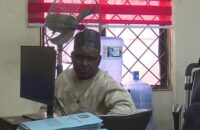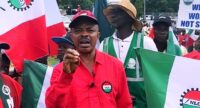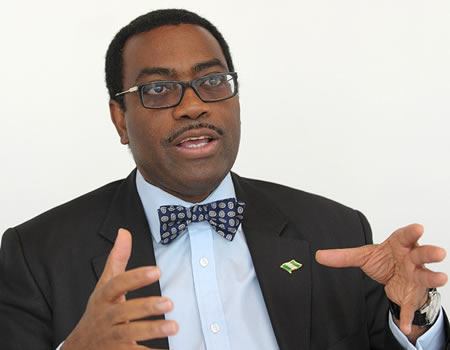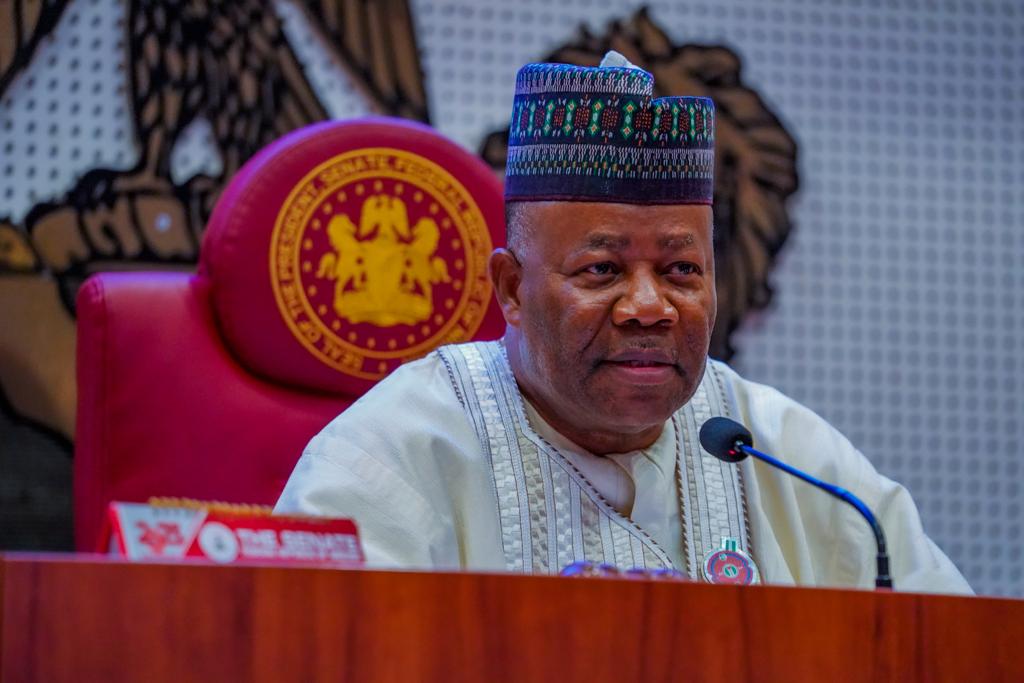The African Development Bank estimates that Africa’s GDP will decline by $173-236 billion by the end of the year
December 5, 2020/AfDB
By Dr. Akinwumi A. Adesina, President of the African Development Bank Group
Akinwumi “Akin” Adesina is the President of the African Development Bank
Your Excellency Dr. Lazarus Chakwera, President of the Republic of Malawi, Honorable Ministers, Eminent Guests, distinguished ladies and gentlemen.
I would like to thank Dr. Ken Giami, the Publisher and CEO of the African Leadership Magazine, organizers of the International Forum on African Leadership, for inviting me to speak to you at this event today. The theme of the event, “Rethinking Global Partnerships and Africa’s Economic Resurgence,” is very apt for the times we are in today.
We live in unprecedented and challenging times with the COVID pandemic.
Globally, over 60 million people have been infected and over 1.4 million have died. In Africa, total infections are at over 2 million, with over 45,000 deaths.
The negative impacts on economies have been massive. The African Development Bank estimates that Africa’s GDP will decline by $173-236 billion by the end of the year. Africa’s economic growth rate is expected to decline by 3.4%.
The world has become more fragile as we all face common existential risks. All are affected, developed and developing countries. There’s no coronavirus for developed countries and coronavirus for developing countries.
Our greatest test and task is to build effective partnerships and reinforce leadership to navigate through the pandemic, save as many lives and possible, reverse the trend, and put the world and its economies back on more resilient recovery pathways.
Leadership and partnerships for a world in need.
The African Development Bank showed leadership and responsiveness in supporting countries to address the pandemic. The Bank launched a $10 billion crisis response facility to support countries’ immediate needs for liquidity.
The Bank also launched a $3 billion fight COVID-19 social bond on the global capital markets, the largest US dollar denominated social bond ever in world history, now listed on the London Stock Exchange, Luxembourg Stock Exchange and Nasdaq.
The speed and quality of the economic recovery process from the pandemic will depend on our shared sense of collective responsibility and the financial capacity of developing countries to address immediate shocks, stabilize their economies, and invest in growing back.
Yet, the disparity in the financial capacity to tackle the pandemic is very stark. While developed countries have spent over $10 trillion as fiscal stimulus for their economies, with spending by Western Europe being 30 times what was spent on the Marshall Plan, developing countries have minuscule fiscal space.
These are stark inequalities which will affect the speed at which different economies recover from the effects of the pandemic. While social distancing is needed to prevent spread of the virus, fiscal distancing must be avoided.
But there are also other divides.
The digital divide has worsened. Countries with poor energy access, electrification rates and limited broadband access could not stay open to transition businesses to the virtual new normal.
The pandemic has further laid bare the divide in the labor market. Those with skills are able to keep their jobs, while low skilled workers, especially those employed in the informal sector lost jobs, worsened by the lockdowns. It’s estimated that up to 30 million jobs will be lost in Africa by the end of the year.
There’s a big divide in healthcare capacities. Prior to the pandemic, Africa had on average only 9 beds per 10,000 people, 2 equipped labs for COVID19 tests, 20 physicians per 10,000 people.
Developed countries have 10 times the number of physicians and nurses and spend 60 times per capita on health.
I am confident that these, and other challenges arising from the pandemic can be overcome. But we must re-think many things and do things much differently than before. We must not put new wine in old wine skins.
As Africa builds back, priority should be put on the quality of growth, not just the quantum of growth. Growth must be more equitable, and focus on sectors that are better able to create jobs.
Building back African economies with resilience requires addressing its high debt levels. Total outstanding debt on the continent is over $700 billion. While bilateral concessional debt finance has declined from 52% to 27% between 2000 and 2019, commercial debt owed to private creditors increased from 17% to 40% in the same period. Private commercial debtors held some $44 billion in Eurobond debt for 10 African countries at the end of September 2020.
Global partnership efforts are being made by the G20 to support debt relief for developing countries through the Debt Service Suspension Initiative. To date 22 African countries have benefitted from the initiative, which has deferred debt payments for $5.2 billion. However, this only represents 4% of Africa’s total bilateral debt. Much larger financial support is needed, and the private sector creditors need to be part of the solution.
The lesson for Africa is clear: Africa simply cannot accelerate its development by relying only on debt, especially expensive bilateral and commercial debt. Africa must grow by mobilizing domestic resources, especially by unlocking its over $1 trillion in pension funds, sovereign wealth funds and insurance funds. These should be better harnessed to help close the annual infrastructure financing gap estimated at $64-108 billion.
Africa will build back faster by also harnessing and better managing the revenue streams from its abundant natural resources, including minerals, metals, biodiversity, blue economy, forest resources, agriculture and oil and gas, in order to boost domestic savings. Going forward, more transparent governance over natural resources must form a key component of financing Africa’s growth.
Africa must build back by focusing sharply on food and nutritional security. For many, the risk of hunger is higher than coronavirus. Without food, medicines or vaccines don’t work. There is vaccination against coronavirus, but there is no vaccination against hunger.
The African Development Bank led the way in providing over $384 million for countries to address immediate food and nutrition issues, including providing access to improved seeds, farm inputs, strategic food reserves and opening up of regional trade corridors to facilitate trade in food.
We must build back by focusing on the private sector, especially the small and medium sized enterprises who are the lifelines of the economy and largest employers of labor.
We must build back by focusing on the youth, many of whom had no jobs prior to the pandemic. That’s why the African Development Bank will support the launch of the Youth Entrepreneurship investment Banks to create a viable financial ecosystem to unleash the entrepreneurship and businesses of young people.
We must build back by ensuring that women are strongly supported, as majority of them have lost incomes, due to their greater dependence on informal markets and sectors such as tourism, hospitality and trade, all of which have been devastated by the lockdowns.
That’s why the Bank will further accelerate its efforts to mobilize $5 billion for women through its Affirmative Finance Action for Women.
We must build back by paying greater attention to climate change and resilience. The African Development Bank will redouble its efforts on the Desert to Power Initiative to provide electricity for 280 million people in the Sahel through solar power systems.
Building forward, the Bank will boost Africa’s capacity to adapt to climate change. That’s why the Bank expects to devote 40% of its total financing to climate finance by 2021.
The Bank is already scaling up support to African countries to insure themselves against climate shocks through the Bank’s Africa Disaster Risk Insurance Financing Initiative.
I was pleased to join forces with former UN Secretary General Ban Ki-Moon to establish the Global Center for Adaptation in Africa, hosted by the African Development Bank, to help leverage additional global resources to support Africa’s climate adaptation.
We must build back by ensuring that there’s universal health care for all. We must expand social protection programs for the poor and ensure universal health insurance, especially for millions of the poor who rely on self-provisioning for health care.
We must build back by building quality health care infrastructure for Africa. We must build Africa’s manufacturing capacity for pharmaceuticals, medicines and vaccine production. The concentration of manufacturing capacity and global value chains outside of Africa poses a great risk to the continent.
That’s why the African Development Bank plans to move into investing in quality health infrastructure to provide better access to quality health care. The Bank will also support the development of Africa’s pharmaceutical industry to manufacture medicines and vaccines in Africa.
The African Development Bank is supporting the development of the Africa Continental Free Trade Area to create competitive industrial manufacturing capacity and wider trade and investment opportunities for the continent. The Bank provided $4.5 million to help create the secretariat for the free trade area.
To further support the free trade area, the African Development Bank is supporting the Africa Exchange Linkage Project, to integrate stock exchanges across Africa. This will create a capital market with capitalization in excess of $1 trillion, representing 90% of Africa’s total equity market. This will increase liquidity and enable seamless trading platforms across the continent.
We must re-think infrastructure and for a “Digital Africa”. As economies recover, the world will become more digital. People, businesses, financial institutions and governments have to rapidly adjust to this “new normal”.
The role of technology, especially digital technology, artificial intelligence, robotics and Internet of Things, will further revolutionize financial inclusion, delivering services, climate information, insurance, and health delivery, especially new models of telemedicine for better access and affordable care.
Therefore, Africa must further accelerate the development of digital infrastructure.
Going forward, we must re-think global health systems and partnerships. In an interconnected world, with so much fluidity, securing health requires that we rethink and reconfigure institutions. We should now be strengthening the regional and national health institutions. For nations and the regions must lead efforts, now, and in the future. That’s why the African Development Bank provided $27 million to the Africa Center for Disease Control to take the leadership in tackling the pandemic.
The pandemic is a shock to the world. Yet, working together we will overcome challenges arising from it. We will arise, we will reset and we will rebuild.
For that, leadership is critical, at all levels.
Leadership that will inspire not aspire. Leadership that will strengthen, not weaken and diminish.
Leadership that will build cooperation, not reinforce isolation.
Leadership that will look for common and collective interest, not build walls of nationalism and exclusivity.
We must hold hands together, and rebuild together. We are only as strong as the partnerships we build together, for after all, all lives are created equal.
This is the time for audacious global leadership.
Leadership that is able to navigate complexities and restore hope and confidence, to grow back, safer, better, healthier and with greater resilience.
Leadership that brings out the best in all of us.
Let’s work together to make the world a better place for all.
Thank you all very much.














